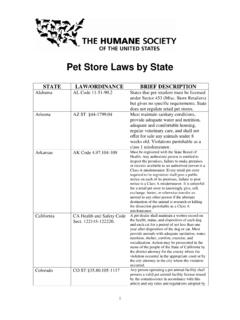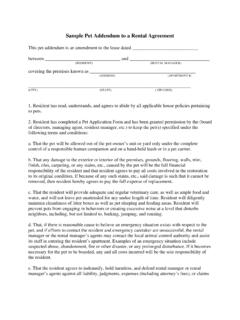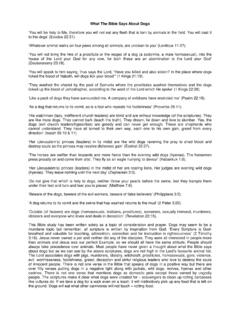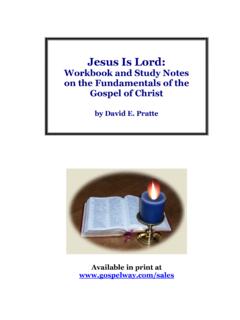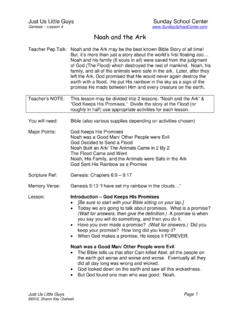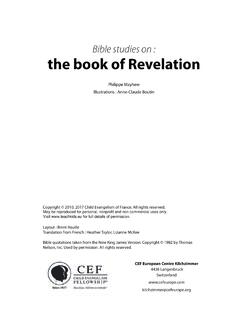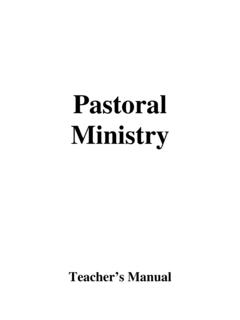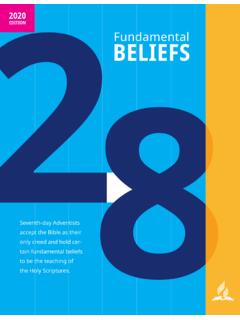Transcription of The Bible’s Teachings
1 The bible s Teachings on Protecting Animals and Nature32who hates you lying under its bur-den, you shall refrain from leavinghim with it, you shall help him tolift it up (Exodus23:4-5).The Ten Com-mandments specifi-cally mentions thatcattle and donkeysmust not be workedon the Sabbath. Inthe twenty-thirdchapter of Exodus,several animal-pro-tection statutes aregiven by God toMoses: Six daysyou shall do yourwork, but on the seventh day youshall rest; that your ox and yourass may have rest .. (Exodus23:12). Similarly, the seventhday is a sabbath to the Lord yourGod; in it you shall not do anywork, you, or your son .. or yourox, or your ass, or any of your cattle (Deuteronomy 5:14).God also commands that everyseventh year one should not sowor harvest the land, the vineyards,and the olive groves.
2 They shouldbe allowed to rest and lie fallow (Exodus 23:11). God commandsthat what grows naturally in thefields left fallow in the seventhyear shall be for oneself, one s ser-vants, one s guests, and for yourcattle and also for the beasts thatare in your land all its yield shallbe for food (Leviticus 25:4-7).Forbidding Cruelty to AnimalsThe bible forbidscruelty todomestic animals. It would be harsh toprevent the ox fromeating while work-ing, and consequent-ly Deuteronomy25:4 reads, Youshall not muzzle an ox when it treadsout the grain. Moreover,Deuteronomy 22:10says, You shall not plow with anox and an ass together. Pairinganimals of different sizes andstrengths would place a strain on the weaker of them, or perhapson both. Contrast these ancient lawsthat sought to reduce animal suf-fering with modern-day factoryfarming practices.
3 Today, for exam-ple, farmers take calves raised forveal from their mothers at birth,deny the calves their mother smilk, and deliberately deprive thecalves of iron. Farmers often keepthe calves their entire lives incrates so narrow that they cannotturn around. These circumstancesrender the calves muscles soft andanemic, making the flesh tenderand lightly colored. Such treat-ment is incompatible with theBible s bible and the Judaic-Christian tradition teach and command us to treat animalswith kindness and respect. Themassive abuse and suffering legallyinflicted on billions of animalsevery year is a clear violation ofthe Teachings of our religious faithand cannot be justified by any person of faith and people for whom the Biblewas written thousands of years agowere intimately familiar withwildlife and domestic animals,especially the practice of raisingcattle and other animals.
4 The Biblecontains strict rules governing thetreatment of farmed animals, andindeed all of God s creatures, whichwere designed to prevent anyunnecessary pain and suffering. Modern day animal agricultureviolates core Christian values. Itwipes out entire populations andspecies of wildlife, confines hugenumbers of animals in miserableconditions on factory farms, dam-ages the environment, squandersscarce resources, and harms thehealth of people. The Ten Commandments:Do Not OverworkAnimalsThe Mosaic Law in the HebrewScriptures forbids overworkinganimals and requires that peoplehelp stray and lost creatures. Manyinjunctions are clearly written forthe sake of the creaturesand not the owners. The Law requires thatone help animals whobelong to enemies towhom one owes no obli-gation, as well as thoseof friends.
5 One maynot pass by ananimal in dis-tress: If youmeet yourenemy s ox orhis ass goingastray, you shallbring it back to you see the ass of oneA righteous man has regard for the life of his 12:10 God s Ideal Includes Peacewith AnimalsThe book of Hosea (2:18) sug-gests that God would make apact with the animals to give themsafety from being hunted and per-secuted by abolishing the instru-ments of their destruction: And Iwill make for you a covenant onthat day with the beasts of thefield, the birds of the air, and thecreeping things of the ground; andI will abolish the bow, the sword,and war from the land; and I willmake you lie down in safety. The Book of Job 5:23 describesas an ideal a day when humankindwill be at peace with nature: Foryou shall be in league with thestones of the field, and the beastsof the field shall be at peace withyou.
6 Isaiah 11:6-9 eloquently depictshow the animal kingdom will beincluded in the blessings of peaceon earth when it is achieved: Thewolf shall dwell with the lamb,and the leopard shall lie downwith the kid, and the calf and theyoung lion .. and the lion shall eatstraw like the ox.. They shallnot hurt nor destroy in all my holymountain: for the earth shall befull of the knowledge of the Lord .45A Righteous Man Has Regard for the Life of His BeastProverbs 12:10 declares, A right-eous man has regard for the lifeof his beast, but the mercy of thewicked are cruel. This importantverse suggests a Biblical division ofpeople into two distinct types those who are righteous and justare kind to their animals, and thosewho are wicked and are cruel tocreatures under their story of Rebekah at thewell stresses the importance ofkindness to animals as a personalattribute.
7 In this account, thepatriarch Abraham,seeking a wife forhis son Isaac, sendshis trusted servantout to search for asuitable servant choosesRebekah after shedemonstrates a kinddisposition by draw-ing water not justfor him but also forhis camels (Genesis 24:19).Similarly, 2 SamuelChapter 12, Goduses the sad story of the inexcus-able killing of a family s belovedpet lamb to show King David theerror of his ways. When Jacob called together histwelve sons representing thetwelve tribes of Israel to say whatfate would befall them, Simeon andLevi were castigated and chastisedfor crippling oxen, among otherthings (Genesis 49:6-7). The Beasts of the FieldShall Be at Peace with TheeThe Book of Psalms relates thatGod s goodness and compas-sion are not reserved just forhumans but extend to all of God screatures.
8 Psalm 36:6-7 praisesGod, saying man and beast thousavest, O Lord. How precious isthy steadfast love, O God! Thechildren of mentake refuge in theshadow of thywings. Psalm 145 reiter-ates this theme ofGod s concern forall God s creatures: The Lord is goodto all, and his com-passion is over allthat he has thou satisfiestthe desire of everyliving thing (9, 16).Similarly, God s explanation toJonah for why God elected not todestroy Nineveh reflected God sconcern for animals. The greatcity contained 120,000 people and also much cattle (Jonah4:11).The Lord is good to all, and his compassion is overall that he has 145:967 Reverence for Life in the New TestamentThe New Testament containsmany references favorable toprotecting animals and nature. InLuke (12:6), Jesus stresses that Godloves even the lowliest of crea-tures: Are not five sparrows soldfor two pennies?
9 And not one ofthem is forgotten before God. Matthew 10:29 also reports Jesus belief that God cares for all God screatures, even those of little mon-etary value tous. In teachingGod s infinitewisdom andlove formankind,Matthewquotes Jesus assaying: Arenot two spar-rows sold for a penny? And notone of them will fall on the groundwithout your Father s will. In Luke (13:15), Jesus uses theBiblical laws of humane treatmentof animals to justify healing a crip-pled woman on the Sabbath, say-ing, Does not each of you on thesabbath untie his ox or his assfrom the manger, and lead it awayto water it? Again in Luke, Jesussimilarly justifies healing a manon the Sabbath, saying, Which ofyou having a son or an ox that hasfallen into a well, will not immedi-ately pull him out on a sabbathday? (14:5) And in the Sermon onthe Mount, Jesus speaks of thebirds of the air , saying that yourheavenly Father feeds them (Matthew 6:26).
10 Interestingly, the NewTestament never depicts Jesus eat-ing meat in his lifetime, not evenat the Last Supper, although ontwo occasions after his death andresurrection the bible describes hiseating Christians see deep sig-nificance in the story of Jesusbeginning his life among the ani-mals (Luke2:7). Deniedshelter andlodging by thehumans ofBethlehem inJudea, Maryand Josephwere forced touse a mangerfor Jesus birthplace. There, Jesuswas born, presumably in the com-pany of such creatures as donkeys,oxen, cows, and sheep. Jesus appreciation for animalsis demonstrated by the repeatedanalogies and references to ani-mals that he used in his referred to his followers, andthose who worship God, as sheep,and he compared God s care forJerusalem with a hen s concern forher brood. Often in his Teachings ,Jesus compared himself to suchanimals as the lamb and the dove,known for their innocence, meek-ness, and often represent-ed animals as beingunder God s provi-dence, and Jesus repeated statementsto practice love,mercy, and compas-sion are consistentwith, and indeedfundamental to, thehumane and preser-vation bible s ConservationMessage The obligation of humans torespect and protect the naturalenvironment is a theme thatappears throughout the , the mandate directlyrelates to the problems we facetoday cruelty to farmed animals,destruction of wildlife and habitat,and pollution of the land, water,and air.







